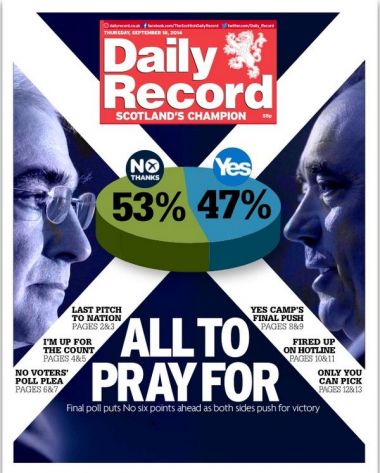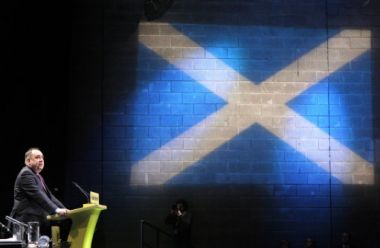God and independence: How churches on both sides of the border are preparing for the result

Churches along the border of England and Scotland are hoping the close relations that characterise the region will remain intact after the historic referendum on independence taking place today.
Scots have been queueing up since the early hours of the morning to cast their votes at polling stations across Scotland.
It follows months of intensive campaigning by Yes Scotland and Better Together. Both campaigns have been been criticised for heated engagement, and for invoking emotion over fact.
With the hours counting down before the result is revealed, questions still remain on a raft of key issues, like border controls, membership in the EU, and its currency.
But it's not only Scots who will be glued to their TV sets tonight. English people living just south of the border are also awaiting the outcome with anticipation – and prayer.
"It's on everybody's lips," says Rob Scott-Buccleuch, of Hebron Evangelical Church in Carlisle.
Typical for a region where Scots and English have rubbed shoulders for generations, his ancestry hails from both nations.
And his is not an uncommon story for the area. Although he lives and works in Carlisle, he is frequently over the border in Scotland, not least for a spot of shopping at a local mall just six miles away in Gretna.
Many locals are concerned about what the outcome of the referendum will mean for the border hopping they are so accustomed to.
Alan Meyer, senior pastor of Elim Carlisle, said: "The consensus around town is that we want Scotland to remain in the UK. I have no great concern about relations between England and Scotland after the vote. My concerns are more about the impact economically and on industry, as [independence] could adversely affect cross-border travel."
Over in the Scottish town of Kelso, Elizabeth Topp of St Andrew's and St Mary's is asking the same questions.
"We shop in England, we have businesses across the border," she says.

"There is real concern about how it will affect people's livelihoods. I personally have family in England, my son lives there, and I wouldn't like to think that at some point in the future I will have to produce my passport to go and visit him."
Questions about border control have arisen because of the uncertainty surrounding an independent Scotland's membership in the Common Travel Area and the EU, particularly whether it would be subject to the Schengen Agreement.
"If that were the case, England would definitely want border controls," Mrs Topp said.
A half hour's drive east, across the border into England and it's a similar story in Berwick-upon-Tweed, a town that has experienced, probably more than others, Scotland's often fractious relationship with its "Auld Enemy".
"We are all wondering what the effect on Berwick will be," said Rev Dennis F Handley, vicar of Berwick Parish Church. "There are people who live in Berwick and work in Scotland, and people who live in Scotland and work in Berwick. There are local farmers with land on both sides of the border in England and Scotland."
Indeed, the word on the lips of border communities appears to be "uncertainty" and in Mr Handley's view at least, this feeling is in part because there are "no real details" about what will actually happen one way or another.
While some local reports he has read say independence would bring more trade to Berwick, others conclude the opposite and warn that companies will be more likely to base themselves in Scotland.
"It's hard to say [how things will be]," he added.
"Will the promises [of more power in the event of a no vote] be kept?," added Mrs Topp. "There are a lot of unknowns whichever way it goes."
In the event of a no vote, Mr Meyer fears the promised concessions for the people of Scotland will give rise to increased feelings of dissatisfaction among communities in the North of England, another region where a sense of disenfranchisement from the Westminster government is common.
"Whichever way it goes there will be more concessions for Scotland and people in the North will feel they are not adequately catered for here. This feeling will only increase whatever happens," he said.
With so many unanswered questions and relations between Yes and No supporters increasingly fraught in the weeks leading up to the referendum, churches are keeping the people of Scotland in their prayers.
Rev Handley said: "We are definitely holding the people of Scotland in our prayers. Berwick has a close relationship with Scotland and England, and I hope these links will continue as we both benefit from each other."
Mrs Topp agreed, saying that whatever the outcome, "There is a real hope that, come tomorrow, people will still be speaking to each other."
Some 4.2 million Scots are registered to vote and polling stations will be open until 22:00 on Thursday. A declaration is due between 06:30 and 07:30 on Friday, but the announcement of running totals throughout the night mean that the result may be apparent much earlier on.
As to the outcome of one of the most important votes in UK history, Mr Scott-Buccleuch thinks that the Nos will have it. He does admit to some worry about how strongly pro-independent Scots will handle a No vote, but he is optimistic that emotions will settle down with time and relations between Scots and English, in his neck of the wood at least, will remain healthy.
"There is no animosity because we are so used to each other," he said. "There is certainly not as much as some might expect. And long may it stay that way."











